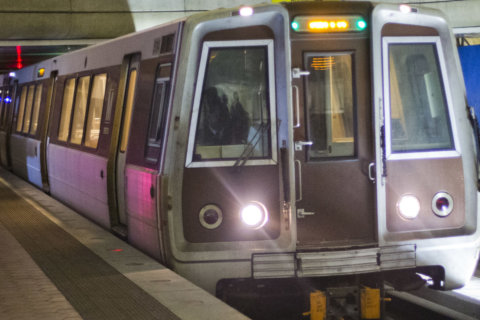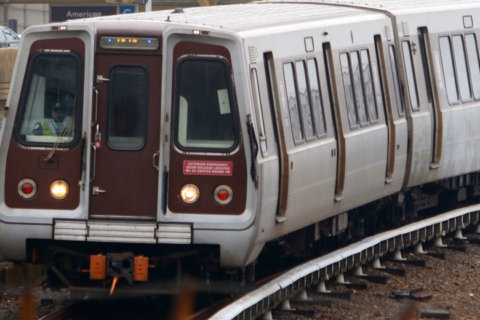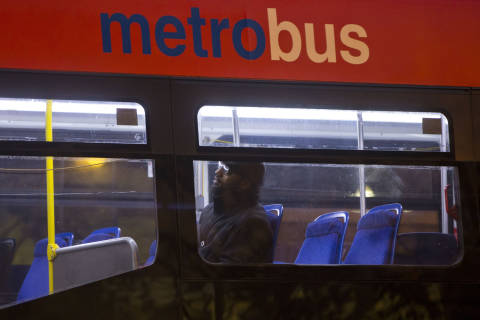Metro could charge riders extra to use the new Dulles International Airport station, create new weekend passes and make other changes to budget proposals due to kick in next year.
Adding a special $1 additional fee for trips to and from Dulles Airport is a new Maryland proposal among several introduced Thursday to the Metro Board.
The new ideas, combined with the unusually extensive nature of the initial changes proposed this year by General Manager Paul Wiedefeld, led the board to delay a vote authorizing public hearings until next month.
In addition to fare changes and additional rail service hours announced in October, Metro staff detailed a list of proposed bus cuts this week that have prompted quick and strong backlash across the region.
“We’re still working through it,” Wiedefeld said.
After WTOP reported on the proposed cuts, a number of local leaders spoke against them, and several riders also complained at Thursday’s board meeting.
The details of the proposed bus changes were taken down Thursday from the Metro Board website.
“We’ll work over the next few weeks and then come out with something again in January, so that hasn’t been finalized,” Wiedefeld said.
For now, the $26.6 million in total projected savings from bus cuts are now factored into Metro staff’s general budget plan.
Initially, Metro had only planned to suggest smaller scale, more typical changes based on ridership.
The new cuts aim to reduce service that might be near other bus or rail lines, while still providing “at least a minimum level of coverage across the region, and we think that this is a better recommendation to the board,” Chief Financial Officer Dennis Anosike said.
Several Glover Park residents who spoke during the Metro Board’s public comment period Thursday said there would be no other options for them if routes like the D2 were cut.
“I suspect … many of those routes are going to be retained, and if we’re going to retain those routes we need to compensate,” Maryland Metro Board Member Michael Goldman said after the meeting.
He cites the budget needs as one reason Maryland is proposing the additional $1 fee for riders who get on or off trains at Dulles Airport when the Silver Line opens late next year.
“What we tried to set out here is a number of potential revenue raisers that could be used to compensate for restoring some of the bus service proposed for cuts,” Goldman said.
The fee is not likely to be embraced by Virginia, but Goldman argues it would target long-distance travelers
“The theory of that is this is a premium service for our foreign visitors and people traveling,” Goldman said.
While airport workers are heavy users of transit services, Goldman said they could avoid the extra fee if it is adopted by buying monthly passes.
“This is still a very attractive way to get downtown D.C. or come from D.C. out to the airport,” Goldman said.
Other Maryland proposals aim to reduce the costs for long-distance trips, as the state focuses on its rush hour commuters.
It is “designed to rebalance the fare increases between short-haul riders and long-haul riders,” Goldman said.
Maryland wants to see shorter trips cost more — a minimum of $2.50 at rush hour — while not increasing the cap on the cost of longer trips above $6.50. Wiedefeld proposed raising the cap from $6 to $7.
Maryland is also proposing raising express bus fares by $1 to $5.25, and the newly proposed weekend flat rail fare to $2.75 rather than $2.
Even at $2, the Riders’ Advisory Council is unsure about the value of the weekend flat fare.
An increase to $2.75 would mean the proposed rush hour fare increases are also carried over to all but some of the longest-distance weekend trips.
The riders’ advisory group is also concerned about a proposal to charge a quarter more for riders who load cash onto their cards on Metrobuses or who pay with cash, a change Anosike described as a cost saving move since it would reduce collections expenses.
Virginia offered separate amendments to the budget plans that would aim to continue to increase the use of eight-car trains, create new one-day and three-day passes marketed for weekend use, and restore Metro’s policy of charging peak fares after midnight on Friday and Saturday nights if rail service is extended to 2 a.m. as Wiedefeld proposed.
The budget proposal already includes charging peak fares for off-peak service between 5 a.m. and 6 a.m. on weekdays, when train service would be cut back from every eight minutes to every 12 minutes on each line.
Virginia is also asking for local bus systems like Montgomery County’s Ride On and Fairfax County’s Fairfax Connector to be included in unlimited ride monthly Metro passes as long as it does not increase the cost of the passes by more than $10.
“We think that this is vitally important considering proposals of fare increases and free transfers that are before the board this year,” Metro Board Chairman and Virginia representative Paul Smedberg said.
Despite the delay in Thursday’s authorization vote, public hearings are still expected in late January or early February, with final budget adoption expected in March.







